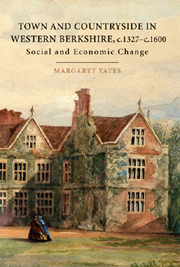Book contents
- Frontmatter
- Contents
- List of tables, figures, and maps
- Acknowledgements
- Abbreviations
- Sums of money
- 1 The end of the Middle Ages?
- 2 Landscapes, population and wealth in western Berkshire from the fourteenth to the sixteenth century
- 3 Town and country relations: Newbury and its hinterland
- 4 Estate management and profitability
- 5 Tenant society
- 6 Conclusion: the chronology of change
- Appendices
- Bibliography
- Index
1 - The end of the Middle Ages?
Published online by Cambridge University Press: 05 February 2013
- Frontmatter
- Contents
- List of tables, figures, and maps
- Acknowledgements
- Abbreviations
- Sums of money
- 1 The end of the Middle Ages?
- 2 Landscapes, population and wealth in western Berkshire from the fourteenth to the sixteenth century
- 3 Town and country relations: Newbury and its hinterland
- 4 Estate management and profitability
- 5 Tenant society
- 6 Conclusion: the chronology of change
- Appendices
- Bibliography
- Index
Summary
A powerful concept has developed in the minds of historians and the history reading public alike that society and the economy of the sixteenth century were fundamentally different from what had gone before. A historical fault line of seismic proportions lies at the end of the fifteenth century. It has been re-enforced by the institutional and academic divisions within the discipline into ‘periods’ of history as medieval, early modern and modern which have led to segregation into specialisms and a fragmentation of research into chronologically discrete agendas. This notion is now challenged by medievalists who argue that core structures and important changes were already under way before 1400 and many had their roots in an earlier period. The purpose of this book is consciously to bridge the historical divide at the end of the middle ages through a case study of western Berkshire that identifies evidence for the nature and pace of change in town and countryside from the fourteenth century and continues through the sixteenth century. In doing so it addresses key historical questions of what changed, when and why in a period that has become characterised as one of transition.
To understand how the idea of an end to the middle ages developed we need to begin with the Italian Renaissance. In the conditions of rapid social and cultural change scholars wanted to create a direct link between themselves and the period of classical antiquity, and in doing so to distance themselves from the more recent past which they regarded as significantly different from their own time.
- Type
- Chapter
- Information
- Town and Countryside in Western Berkshire, c.1327–c.1600Social and Economic Change, pp. 1 - 23Publisher: Boydell & BrewerPrint publication year: 2007



